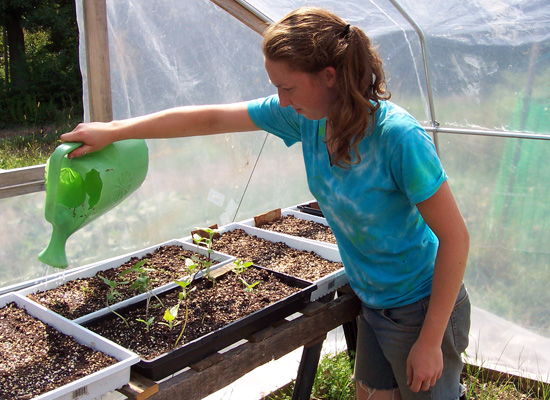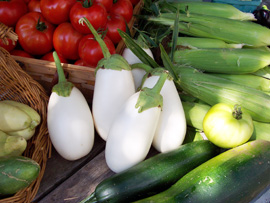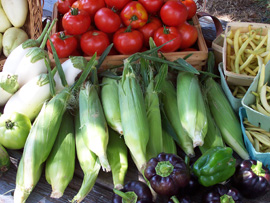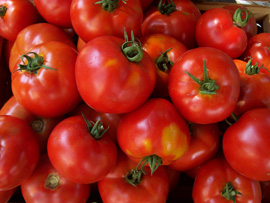Wesleyan’s Long Lane Farm Growing Up – and Out
 |
|
Rachel Ostlund 08 sprinkles seedlings inside a shelter at Long Lane Farm. The farm is expanding this spring to a full acre. Pictured below are vegetables grown last year by the Long Lane Farming Club. |
| Posted 04/17/06 |
| Although Wesleyans Long Lane Farm Club uses organic methods to grow its produce, a little Miracle Grow has been sprinkled on one aspect of their garden: its progress.
Maddie Thomson 08 got involved in the farm last spring, favoring the idea of organic farming. When a person buys a tomato at the grocery store, chances are, it was not locally grown, she says. So much of our food is grown halfway across the world and shipped here using enormous amounts of fossil fuels, Thomson says. I think it’s really important to think about where our food comes from, and whether it’s produced sustainability. There is a growing movement to rethink the way we produce food, and at Long Lane we’re part of that movement, which is really exciting. The 50 members of the Long Lane Farming Club are thrilled to expand to a full acre. Knowing it will take extra helping hands, about 15 volunteers from the Wesleyan community have been recruited to help out with watering, weeding, pruning, mixing soil and other gardening duties. Almost all the work is done by hand.
The club will have a farm stand in low-income areas of Middletown and can accept food stamps. Everything that doesn’t sell will go to soup kitchens. The Long Lane Farm has more than 80 vegetables and herbs grown in the two-year-old organic garden. This includes tomatoes, broccoli, kale, carrots, lettuce, kohlrabi, beets, corn, beans, eggplants, zucchini, pumpkins, squash. New this year will be a garlic crop. The Wesleyan students have already planted seedlings inside their student residences. Once its warm enough, they will replant the seedlings into the garden. This summer the student farmers plan to hire four interns to work on the farm. Since the farm doubles as an educational tool for the community, the Long Lane Farm has partnered with Snow Elementary School in Middletown to get kids out in the farm to work, play, learn about farming and plants, and taste-test a few vegetables.
I just love that Long Lane Farm is a totally student-run farm, so that we get a chance to see and participate in all of the aspects of running it, Thomson says. The Long Lane Farm is funded by the Earth and Environmental Sciences Department, the Rockfall Foundation and personal donations. It relies on donations to pay summer interns and make the garden possible. For more information or to make a donation to the Long Lane Farm, e-mail longlanefarm@wesleyan.edu. |
| By Olivia Drake, Wesleyan Connection editor |


 The Long Lane Farm Club was created in 2004 so students would have a place to come together and learn about food security issues. What began as a 50-foot plot of flowers and vegetables will be expanded into a full acre this spring. The expanded cultivation area will increase the clubs produce, which is shared by Wesleyan students and the local community.
The Long Lane Farm Club was created in 2004 so students would have a place to come together and learn about food security issues. What began as a 50-foot plot of flowers and vegetables will be expanded into a full acre this spring. The expanded cultivation area will increase the clubs produce, which is shared by Wesleyan students and the local community. In addition, the club’s Community Supported Agricultural Project will have 10 members this year. These members support the garden by paying a fee, and every week for 10 weeks, they receive a share of the produce. Each pays $350, of which $150 is a donation to make produce available to food-insecure people. Members also participate in the distribution process by manning the tables every week to help pass out food to the other members.
In addition, the club’s Community Supported Agricultural Project will have 10 members this year. These members support the garden by paying a fee, and every week for 10 weeks, they receive a share of the produce. Each pays $350, of which $150 is a donation to make produce available to food-insecure people. Members also participate in the distribution process by manning the tables every week to help pass out food to the other members.  In 2004, Rachel Lindsay 05 planted the first crops in a circular-shaped plot. Local residents rounded out the corners with garlic and potato gardens, among several flower beds. Lindsay, Rachel Ostlund 06 and other Wesleyan students later planted a tomato and broccoli garden, among rows of Swiss chard, pumpkins and squash.
In 2004, Rachel Lindsay 05 planted the first crops in a circular-shaped plot. Local residents rounded out the corners with garlic and potato gardens, among several flower beds. Lindsay, Rachel Ostlund 06 and other Wesleyan students later planted a tomato and broccoli garden, among rows of Swiss chard, pumpkins and squash.